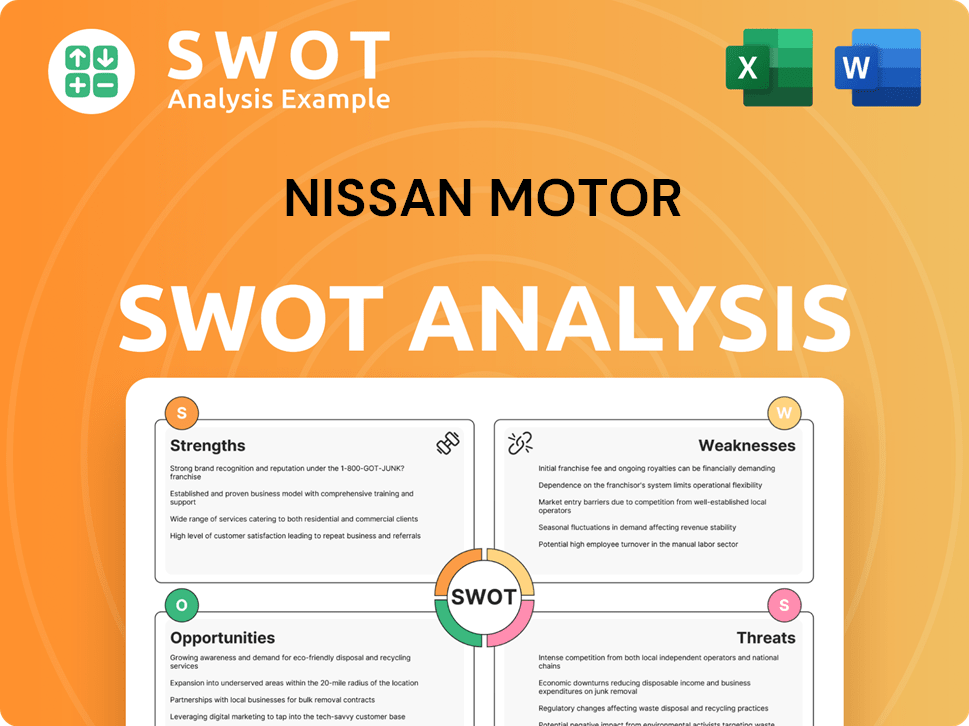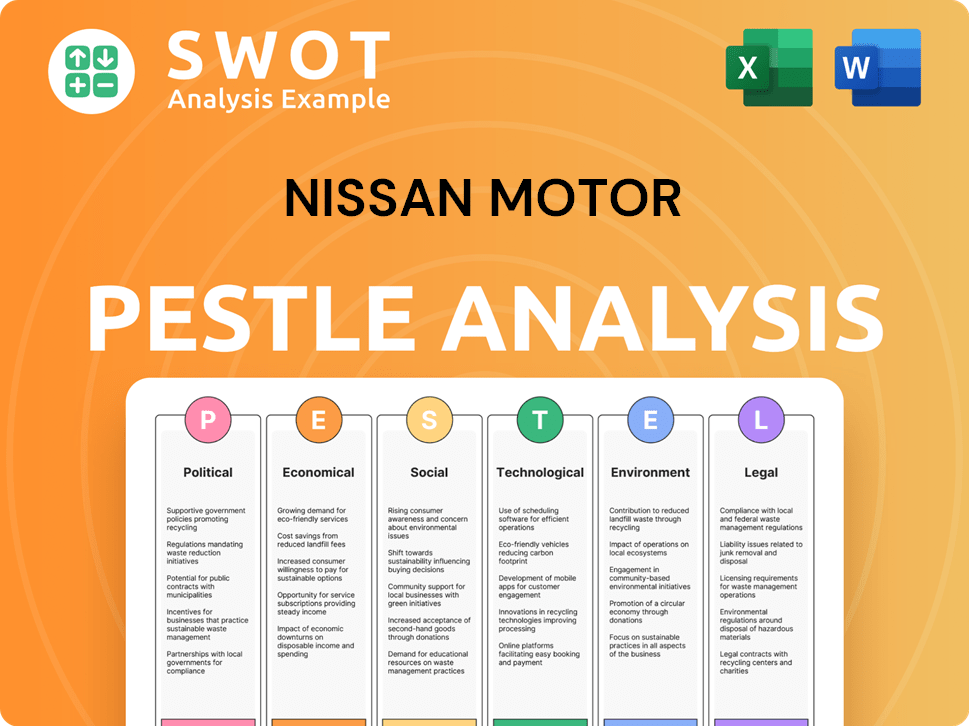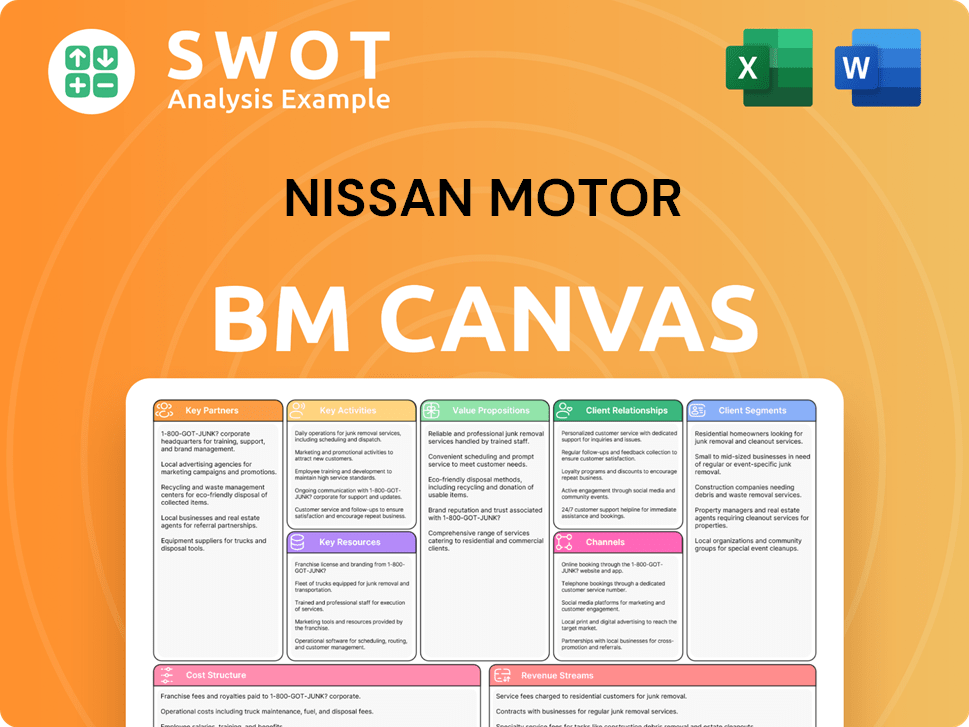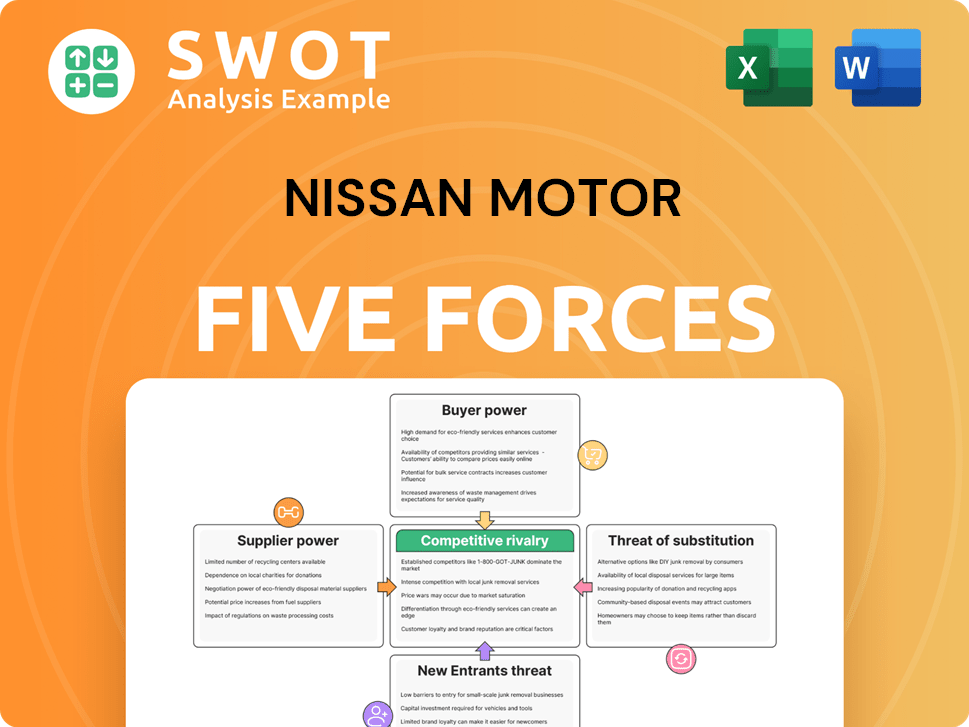Nissan Motor Bundle
How is Nissan Navigating the Shifting Automotive Landscape?
Nissan, a titan of the automotive world, is constantly reshaping its sales and marketing strategies to stay ahead. From its iconic 'Innovation that Excites' campaign to its aggressive push into electric vehicles, Nissan's approach is a masterclass in adaptation. This deep dive explores how Nissan delivers its products, the marketing tactics it employs, and the evolution of its brand positioning in a rapidly changing market.

In fiscal year 2024, Nissan faced both triumphs and challenges, with global sales figures and market share fluctuations reflecting the intense competition. This analysis will dissect Nissan's Nissan Motor SWOT Analysis, examining its performance in key markets like the U.S. and Europe, and how its strategies for customer acquisition and brand positioning are evolving. We'll also explore Nissan's digital marketing initiatives and its approach to attracting new customers, including millennials, in the face of a changing automotive industry, while reviewing its sales performance and competitive analysis.
How Does Nissan Motor Reach Its Customers?
The sales channels employed by the company, reflect a multi-channel approach, blending both online and offline strategies to engage with its diverse customer base. The traditional cornerstone of sales has been physical retail locations through an extensive dealership network. Recognizing the evolving automotive landscape, the company is increasingly integrating online platforms for vehicle sales and customer interaction, adapting to the shift towards digital sales channels.
The company's approach involves a business transformation program aimed at unifying all customer-facing touchpoints—digital, in-car, and physical retail at the dealer—into channel-agnostic journeys. This transformation includes consolidating numerous websites across its global markets and shifting from touchpoints to a customer-centric view. This strategy is essential for maintaining and improving its Nissan automotive marketing efforts.
As of the first half of 2024, the company had 1,071 dealerships in the U.S., highlighting the significance of its physical retail presence. The company's digital strategy is designed to create a localized shopping experience from a single technological base, utilizing platforms like Adobe Experience Manager and Adobe Campaign to facilitate CRM. This hybrid e-commerce approach supports the customer throughout their journey by integrating the transactional component into the digital platform.
The company relies heavily on its extensive dealership network for sales. This network is crucial for providing customers with direct access to vehicles and services. The company continues to optimize its dealer network to enhance customer experience and sales performance.
The company is actively integrating online platforms for vehicle sales and customer engagement. These platforms provide customers with a digital showroom experience. Online platforms are designed to complement the physical dealership network.
Strategic partnerships, such as the Renault-Nissan-Mitsubishi Alliance, are vital for strengthening sales and distribution. These partnerships leverage shared resources and insights to boost brand recognition and market reach. The company also plans to leverage partnerships with the Renault Group and partners from China to further diversify its offerings in Europe.
Mexico continues to serve as an important export hub, facilitating the distribution of vehicles to various markets. This hub is essential for supporting the company's global sales strategy. The company leverages its export hubs to streamline its supply chain and enhance its global presence.
The company's sales strategy is built on a foundation of a strong dealer network, integrated with digital platforms, and supported by strategic partnerships. This multi-channel approach aims to provide a seamless customer experience across all touchpoints. The company focuses on enhancing customer acquisition and retention through various initiatives.
- Dealer Network: The company’s extensive network provides direct customer access.
- Digital Platforms: Online platforms enhance customer engagement and sales.
- Strategic Partnerships: Alliances strengthen sales and distribution capabilities.
- Export Hubs: Mexico is a crucial export hub for global distribution.
Nissan Motor SWOT Analysis
- Complete SWOT Breakdown
- Fully Customizable
- Editable in Excel & Word
- Professional Formatting
- Investor-Ready Format

What Marketing Tactics Does Nissan Motor Use?
The marketing tactics employed by the company are a blend of traditional and digital methods, aimed at raising brand awareness, generating leads, and boosting sales. Digital marketing is a key focus, with significant investments in social media platforms like Instagram, Facebook, and Twitter to connect with a broad audience and foster personal relationships with consumers. This approach is central to the overall Nissan marketing strategy.
The company's strategy includes data-driven marketing and customer segmentation, exemplified by campaigns like 'Nissan Intelligent Mobility.' This utilizes data to understand consumer needs and create personalized content across various digital platforms. In 2024, the digital marketing strategy is focused on strategic online engagement, using data insights for personalized marketing efforts. This approach supports the overall Nissan sales strategy.
Traditional media, including TV, radio, and print advertising, remains part of its integrated marketing communications (IMC) strategy, often combined with influencer partnerships to strengthen brand presence. Experiential marketing, such as the 'Nissan GT Academy,' plays a crucial role in engaging consumers and building brand loyalty. This is a part of the overall Nissan automotive marketing strategy.
Digital marketing is a cornerstone of the company's strategy, with a strong emphasis on social media and data-driven campaigns. The company leverages platforms like Instagram, Facebook, and Twitter to engage with a broad audience.
The company uses data to understand consumer behavior and tailor marketing efforts. The 'Nissan Intelligent Mobility' campaign is an example of this approach, using data to create personalized content.
Traditional media, such as TV, radio, and print advertising, remains part of the integrated marketing communications strategy. These are often combined with influencer partnerships to enhance brand presence.
Experiential marketing, like the 'Nissan GT Academy,' is used to engage consumers and build brand loyalty. These events provide interactive experiences that connect with potential customers.
The company partners with digital advertising platforms like Outbrain to enhance its media strategy. These collaborations help to reach a vast network of users and ensure ads engage the right audience.
The company incorporates AI-driven personalization tactics, such as animated explainer videos, for cost-effective information sharing and customer engagement. This enhances the relevance of marketing messages.
The company's Nissan marketing strategy includes a strong focus on digital marketing, leveraging social media and data-driven campaigns to reach a broad audience. The company's use of animated explainer videos and AI-driven personalization tactics also highlights its commitment to engaging customers effectively. For more detailed insights, you can explore an article about the company's marketing strategies. The company's approach to Nissan customer acquisition includes strategic online engagement and personalized marketing efforts, which are crucial for its Nissan sales performance review.
The company's marketing tactics are multifaceted, combining digital and traditional approaches to build brand awareness and drive sales. These strategies are designed to enhance Nissan brand positioning and improve Nissan market share.
- Digital Marketing: Heavy investment in social media, SEO, and content marketing.
- Data-Driven Marketing: Utilizing data for personalized content and customer segmentation.
- Traditional Media: TV, radio, and print advertising integrated with influencer partnerships.
- Experiential Marketing: Events like the 'Nissan GT Academy' to engage consumers.
- Partnerships: Collaborations with digital advertising platforms like Outbrain.
- Personalization: AI-driven tactics, including animated explainer videos.
Nissan Motor PESTLE Analysis
- Covers All 6 PESTLE Categories
- No Research Needed – Save Hours of Work
- Built by Experts, Trusted by Consultants
- Instant Download, Ready to Use
- 100% Editable, Fully Customizable

How Is Nissan Motor Positioned in the Market?
The brand positioning of the company centers on safety, innovation, and environmental responsibility. This strategy differentiates it from competitors like Toyota and Honda. The core message, 'Innovation that Excites,' aims to redefine driving experiences and how cars integrate into society. This approach is designed to make people feel more confident, excited, and connected to their vehicles.
This is embodied in 'Intelligent Mobility,' which highlights technologies such as ProPILOT for enhanced safety and control, e-POWER for clean and efficient driving, and NissanConnect for seamless integration. This focus helps the company stand out in the competitive automotive market. The company's focus on innovation is a key element of its overall marketing and sales strategy.
The company's target audience is primarily the mid-income demographic aged 25-45. This demographic is targeted through a unique selling proposition that blends technological advancements with a commitment to quality and reliability. The company's communication strategy includes a consistent visual identity, tone of voice, and customer experience across all touchpoints, from advertisements to social media. Understanding the Revenue Streams & Business Model of Nissan Motor can provide further insights into the company's strategic approach.
The company's brand identity consistently emphasizes innovation, safety, and eco-friendliness. This strategic positioning aims to attract a tech-savvy and environmentally conscious consumer base. The brand's messaging focuses on how its vehicles enhance the driving experience.
The primary target audience is the mid-income demographic aged 25-45. This group is targeted with a unique selling proposition combining technological advancement with a commitment to quality and reliability. The brand aims to resonate with consumers who value both innovation and dependability.
The company's marketing communication maintains a consistent visual identity, tone of voice, and customer experience. This consistency is maintained across all touchpoints, including advertisements and social media. Recent logo redesigns focus on simplicity and adaptability for digital media.
The company integrates sustainability and corporate social responsibility into its marketing campaigns. This approach enhances brand image and connects with socially conscious consumers. This strategy aligns with the growing consumer demand for environmentally friendly products.
The company emphasizes 'Innovation that Excites' in its brand messaging. This focus highlights technologies like ProPILOT, e-POWER, and NissanConnect. This approach aims to redefine the driving experience.
Recent logo redesigns underscore simplicity and adaptability for digital media. This ensures global appeal while respecting local influences. The brand is evolving to meet the demands of digital marketing.
The company aims to increase its market share from 6.5% to 8%. However, its U.S. market share fell to 5.8% in the first half of 2024. The company is actively working to regain and grow its market share.
The company responds to shifts in consumer sentiment and competitive threats by introducing unique features. This includes an agile response to tariffs by highlighting U.S.-built models and clear communication. This demonstrates the company's ability to adapt to changing market conditions.
The company's brand communication emphasizes a consistent customer experience across all touchpoints. This approach aims to build strong customer relationships. The goal is to create brand loyalty.
The company differentiates itself from competitors by focusing on safety, innovation, and eco-friendliness. This strategy aims to create a unique selling proposition. The company is working to maintain its competitive edge.
Nissan Motor Business Model Canvas
- Complete 9-Block Business Model Canvas
- Effortlessly Communicate Your Business Strategy
- Investor-Ready BMC Format
- 100% Editable and Customizable
- Clear and Structured Layout

What Are Nissan Motor’s Most Notable Campaigns?
Owners & Shareholders of Nissan Motor have seen Nissan's marketing efforts significantly impact its brand and sales. The company's campaigns have evolved to reflect technological advancements and shifting consumer preferences. A key focus has been on showcasing innovation and addressing customer concerns about safety and environmental impact.
The 'Innovation that Excites' campaign highlights Nissan's technological advancements, including autonomous driving and electric vehicles. Simultaneously, 'Nissan Intelligent Mobility' uses data-driven marketing to address consumer needs. These efforts are supported by multi-channel strategies, combining traditional and digital marketing to create a strong brand presence.
Nissan's digital marketing initiatives have also played a crucial role in its sales strategy. The company has been quick to respond to economic uncertainties. For instance, when online searches spiked for 'Should I buy now?' and 'Nissan car prices', targeted digital campaigns were launched to communicate value.
In the US, Nissan saw strong sales increases in 2024 for models like the Versa (up 71.7%), Sentra (up 39.8%), LEAF (up 57%), and Ariya (up 47%). This indicates effective campaigns targeting affordable and electric vehicle segments.
The Nissan LEAF experienced a 170.4% year-over-year increase in sales in the fourth quarter of 2024. This demonstrates the success of marketing efforts focused on electric vehicles and their appeal to consumers.
In Europe, the JUKE achieved all-time high sales of 104,000 units in fiscal year 2024. The all-electric Ariya also recorded best-ever sales with 20,600 units, highlighting the effectiveness of global marketing campaigns.
Nissan's YouTube advertising campaigns from September 2024 to February 2025 engaged a wide audience by showcasing technological advancements, celebrating craftsmanship, and highlighting community-focused initiatives.
Nissan Motor Porter's Five Forces Analysis
- Covers All 5 Competitive Forces in Detail
- Structured for Consultants, Students, and Founders
- 100% Editable in Microsoft Word & Excel
- Instant Digital Download – Use Immediately
- Compatible with Mac & PC – Fully Unlocked

Related Blogs
- What are Mission Vision & Core Values of Nissan Motor Company?
- What is Competitive Landscape of Nissan Motor Company?
- What is Growth Strategy and Future Prospects of Nissan Motor Company?
- How Does Nissan Motor Company Work?
- What is Brief History of Nissan Motor Company?
- Who Owns Nissan Motor Company?
- What is Customer Demographics and Target Market of Nissan Motor Company?
Disclaimer
All information, articles, and product details provided on this website are for general informational and educational purposes only. We do not claim any ownership over, nor do we intend to infringe upon, any trademarks, copyrights, logos, brand names, or other intellectual property mentioned or depicted on this site. Such intellectual property remains the property of its respective owners, and any references here are made solely for identification or informational purposes, without implying any affiliation, endorsement, or partnership.
We make no representations or warranties, express or implied, regarding the accuracy, completeness, or suitability of any content or products presented. Nothing on this website should be construed as legal, tax, investment, financial, medical, or other professional advice. In addition, no part of this site—including articles or product references—constitutes a solicitation, recommendation, endorsement, advertisement, or offer to buy or sell any securities, franchises, or other financial instruments, particularly in jurisdictions where such activity would be unlawful.
All content is of a general nature and may not address the specific circumstances of any individual or entity. It is not a substitute for professional advice or services. Any actions you take based on the information provided here are strictly at your own risk. You accept full responsibility for any decisions or outcomes arising from your use of this website and agree to release us from any liability in connection with your use of, or reliance upon, the content or products found herein.